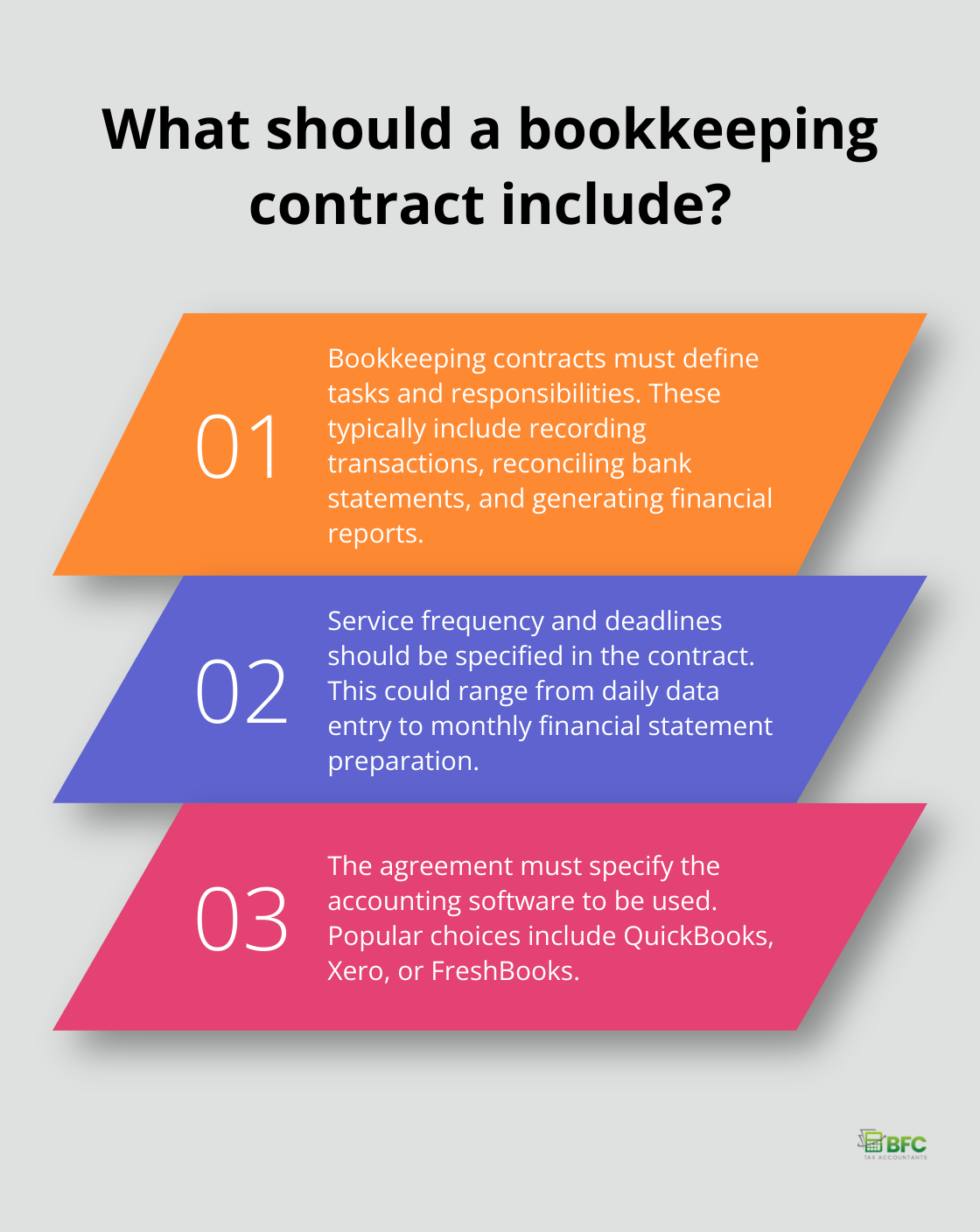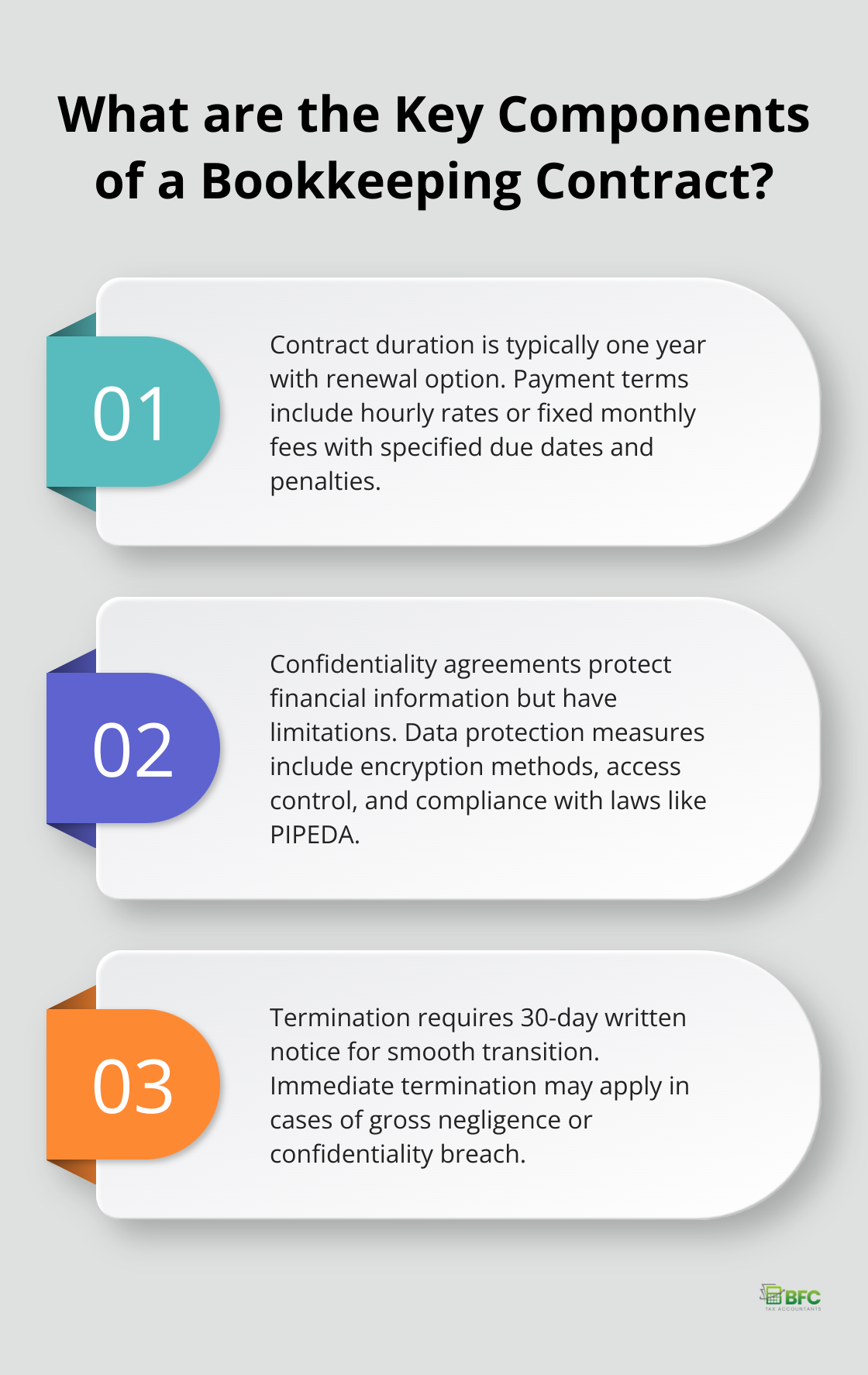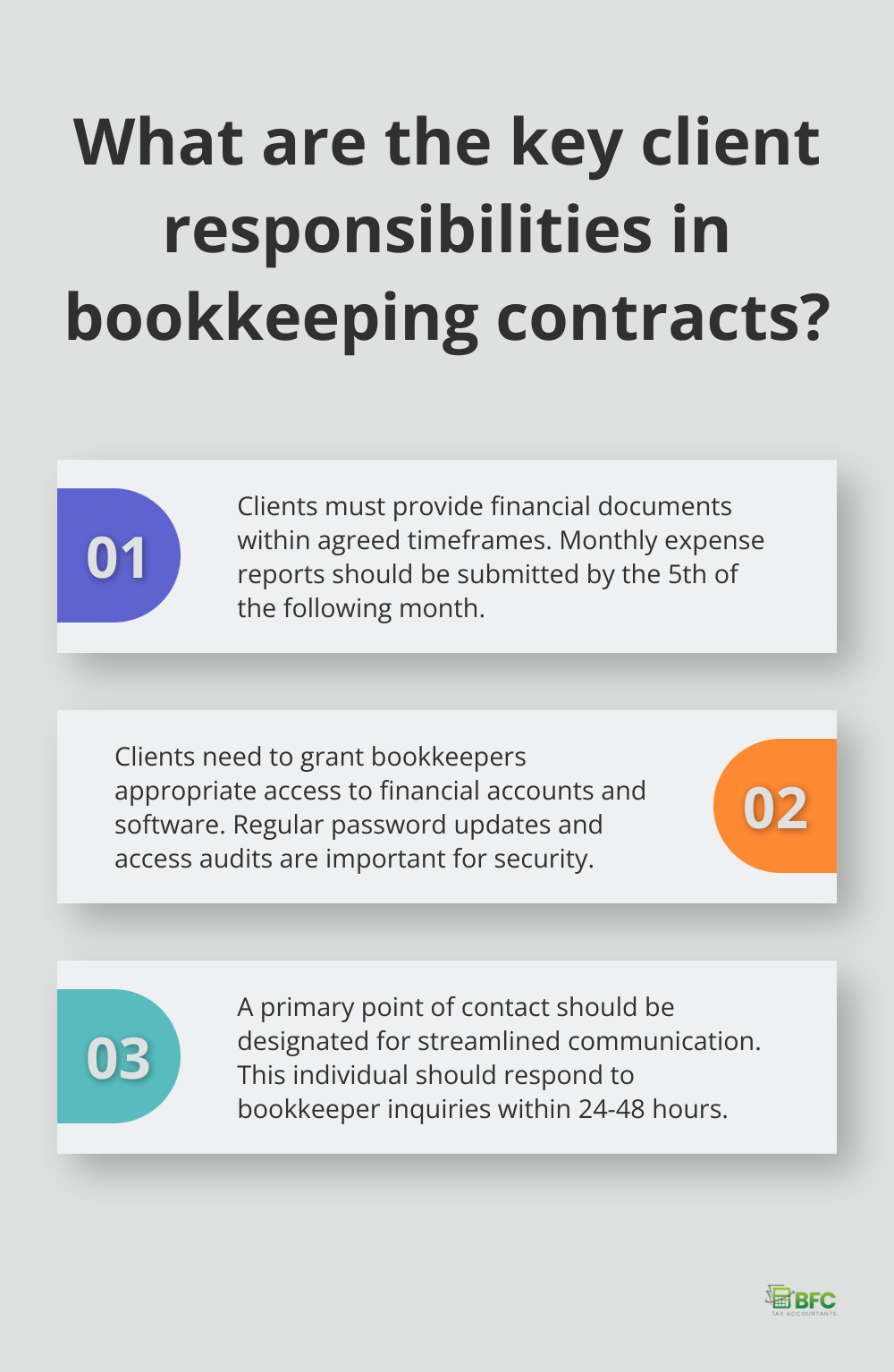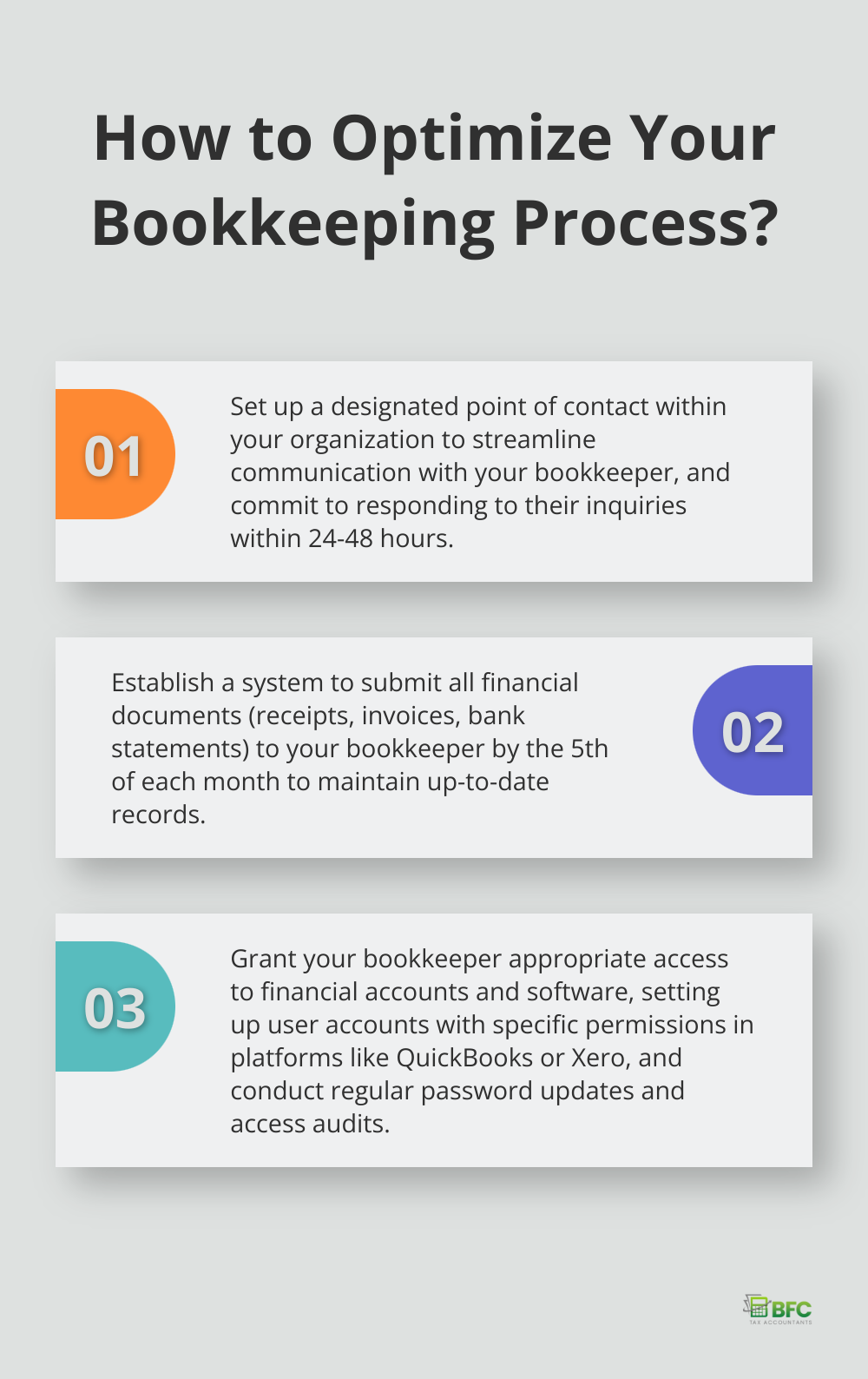At BFC Tax Accountants, we understand the importance of a well-crafted contract for bookkeeping services. A clear agreement sets the foundation for a successful partnership between businesses and their financial experts.
In this post, we’ll explore the key elements that should be included in every bookkeeping contract. From defining the scope of services to outlining client responsibilities, we’ll cover the essential components that protect both parties and ensure a smooth working relationship.
What Should a Bookkeeping Contract Cover?
Defining Tasks and Responsibilities
A comprehensive bookkeeping contract must outline the specific duties of the bookkeeper. These typically include recording financial transactions, reconciling bank statements, and generating financial reports. Financial Cents provides a free template for creating a bookkeeping contract, which can help prevent misunderstandings. For example, a bookkeeper might manage accounts payable and receivable, track expenses, and maintain the general ledger.
Service Frequency and Deadlines
The contract should specify how often services will be performed. This could range from daily data entry to monthly financial statement preparation. For instance, bank reconciliations might occur weekly, while profit and loss statements could be generated monthly. The agreement should also establish deadlines for deliverables (e.g., financial statements ready by the 15th of each month).
Software and Tools
The agreement must specify which accounting software will be used. Popular choices include QuickBooks, Xero, or FreshBooks. If the client prefers a specific platform, this should appear in the contract. The document should also address who will bear the software costs and whether the bookkeeper needs access to any proprietary systems.
Additional Services
Many bookkeepers offer services beyond basic record-keeping. The contract should clearly state if payroll processing, tax preparation, or financial forecasting are included. If these are available as add-ons, their pricing and terms should appear in the agreement. A recent survey found that the average charge for business tax returns increased by $85 compared to the previous year.
Confidentiality and Data Protection
The contract must include clauses that protect the client’s sensitive financial information. This section should outline how the bookkeeper will safeguard data, maintain confidentiality, and comply with relevant privacy laws. It’s essential to specify who has access to financial records and how information will be stored and transmitted securely.

The next chapter will explore the terms and conditions that form the backbone of a solid bookkeeping contract, including duration, payment terms, and liability clauses.
What Are the Essential Terms and Conditions?
A well-structured bookkeeping contract establishes the framework for a professional relationship. Clear terms and conditions protect both parties and ensure smooth collaboration.
Contract Duration and Renewal
Most bookkeeping contracts run for one year, with an option to renew. This timeframe allows for a thorough evaluation of the working relationship.
Payment Structure and Timing
Clear payment terms are essential. Bookkeepers typically charge either an hourly rate or a fixed monthly fee. We recommend to specify payment due dates, late payment penalties, and any provisions for rate increases.
Confidentiality and Data Protection
In the digital finance era, data protection is paramount. Confidentiality agreements are very useful to prevent unauthorized disclosures of information, but they have inherent limitations and risks. A robust confidentiality clause should outline how financial information will be handled, stored, and protected. This includes:
- Specifying encryption methods for data transmission and storage
- Detailing who has access to sensitive information
- Addressing compliance with relevant data protection laws (such as PIPEDA in Canada)
Termination and Notice Periods
A fair termination clause protects both the bookkeeper and the client. Standard practice requires a 30-day written notice for contract termination by either party. This period allows for a smooth transition of services and proper handover of financial records. Some contracts may include provisions for immediate termination in cases of gross negligence or breach of confidentiality.
Liability and Indemnification
Bookkeepers should include a limitation of liability clause to protect against potential lawsuits. Practitioners are cautioned to seek their own independent legal advice as to how to best complete a client engagement where they seek any limitation of liability.

These key terms and conditions set clear expectations and minimize potential disputes. The next section will explore the responsibilities of the client, which play an equally important role in a successful bookkeeping relationship.
What Are Client Responsibilities in Bookkeeping Contracts?
Timely Information Provision
Contract compliance is a measure of how well the parties to a contract are currently doing or have done what they agreed to do, as specified in the contract. Clients must provide all financial documents (receipts, invoices, bank statements) within agreed-upon timeframes. For example, clients should submit monthly expense reports by the 5th of the following month to maintain up-to-date records.
Access and Authorization
Clients need to grant bookkeepers appropriate access to financial accounts and software. This involves setting up user accounts with specific permissions in accounting platforms (such as QuickBooks or Xero). It’s important to balance necessary access with security. Regular password updates and access audits help maintain this balance.
Communication and Point of Contact
Clients should designate a primary point of contact within their organization to streamline communication. This individual should understand the company’s financial operations and have decision-making authority. Regular check-ins (weekly or monthly) ensure alignment on financial goals and challenges.

Clients should also commit to respond to bookkeeper inquiries within a set timeframe (typically 24-48 hours). This responsiveness becomes particularly important during month-end closings or tax preparation periods.
Adherence to Deadlines
Meeting agreed-upon deadlines is essential for maintaining accurate financial records. Clients should submit all required documents by specified dates. If payroll processing is part of the bookkeeping services, clients must submit employee hours and any compensation changes on time.
Financial Software Maintenance
While bookkeepers manage day-to-day entries, clients often need to maintain their financial software subscriptions. This includes timely payments for software licenses and ensuring all necessary integrations with other business systems function properly.
Final Thoughts
A well-crafted contract for bookkeeping services forms the cornerstone of a successful financial partnership. This document defines responsibilities, sets expectations, and addresses potential challenges. Clear contracts benefit everyone involved, providing bookkeepers with a thorough understanding of their duties and giving businesses peace of mind about the services they’ll receive.

Templates can provide a starting point, but we recommend seeking legal advice before finalizing any bookkeeping agreement. A lawyer will ensure the contract complies with local regulations and protects your interests. Professional bookkeeping services offer immense value to businesses of all sizes, helping them navigate financial complexities and maintain accurate records.
At BFC Tax Accountants, we provide expert bookkeeping, tax planning, and financial management solutions tailored to specific needs. Our team in Barrie, Ontario specializes in helping individuals and businesses navigate Canadian tax laws (while maximizing financial efficiency). A solid contract and partnership with experienced professionals will lay the groundwork for long-term financial success.

